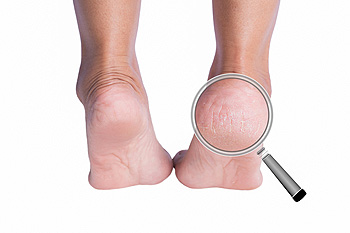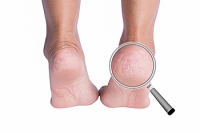 Cracked heels can be caused by many factors. The skin on heels are naturally dry and may crack when exposed to long periods of pressure, such as standing. Additionally, wearing open-backed shoes, like sandals, may progress the condition by allowing the skin to expand and split. Other causes of cracked heels include the lack of moisture from harsh weather and underlying health conditions. Certain medical conditions, including diabetes, eczema, psoriasis, and thyroid disorders, also may be factors in cracked skin on the heels. The aging process can aid in development of cracked heels, due to the skin losing its flexibility over time. Proper foot care, such as moisturizing and supportive footwear, may help prevent this condition. Podiatrists can provide professional care and guidance to manage and treat cracked heels. If the cracked skin on your heels forms fissures or begins to bleed, it is suggested that you consult a podiatrist for treatment to avoid infection.
Cracked heels can be caused by many factors. The skin on heels are naturally dry and may crack when exposed to long periods of pressure, such as standing. Additionally, wearing open-backed shoes, like sandals, may progress the condition by allowing the skin to expand and split. Other causes of cracked heels include the lack of moisture from harsh weather and underlying health conditions. Certain medical conditions, including diabetes, eczema, psoriasis, and thyroid disorders, also may be factors in cracked skin on the heels. The aging process can aid in development of cracked heels, due to the skin losing its flexibility over time. Proper foot care, such as moisturizing and supportive footwear, may help prevent this condition. Podiatrists can provide professional care and guidance to manage and treat cracked heels. If the cracked skin on your heels forms fissures or begins to bleed, it is suggested that you consult a podiatrist for treatment to avoid infection.
Many people suffer from bouts of heel pain. For more information, contact Dr. Kenneth Donovan of Advanced Care Foot and Ankle. Our doctor can provide the care you need to keep you pain-free and on your feet.
Causes of Heel Pain
Heel pain is often associated with plantar fasciitis. The plantar fascia is a band of tissues that extends along the bottom of the foot. A rip or tear in this ligament can cause inflammation of the tissue.
Achilles tendonitis is another cause of heel pain. Inflammation of the Achilles tendon will cause pain from fractures and muscle tearing. Lack of flexibility is also another symptom.
Heel spurs are another cause of pain. When the tissues of the plantar fascia undergo a great deal of stress, it can lead to ligament separation from the heel bone, causing heel spurs.
Why Might Heel Pain Occur?
- Wearing ill-fitting shoes
- Wearing non-supportive shoes
- Weight change
- Excessive running
Treatments
Heel pain should be treated as soon as possible for immediate results. Keeping your feet in a stress-free environment will help. If you suffer from Achilles tendonitis or plantar fasciitis, applying ice will reduce the swelling. Stretching before an exercise like running will help the muscles. Using all these tips will help make heel pain a condition of the past.
If you have any questions please contact one of our offices located in Warren, Livingston, and Toms River, NJ . We offer the newest diagnostic and treatment technologies for all your foot and ankle needs.

